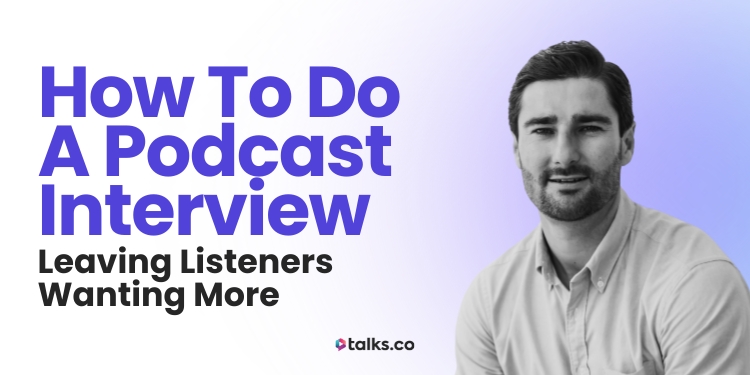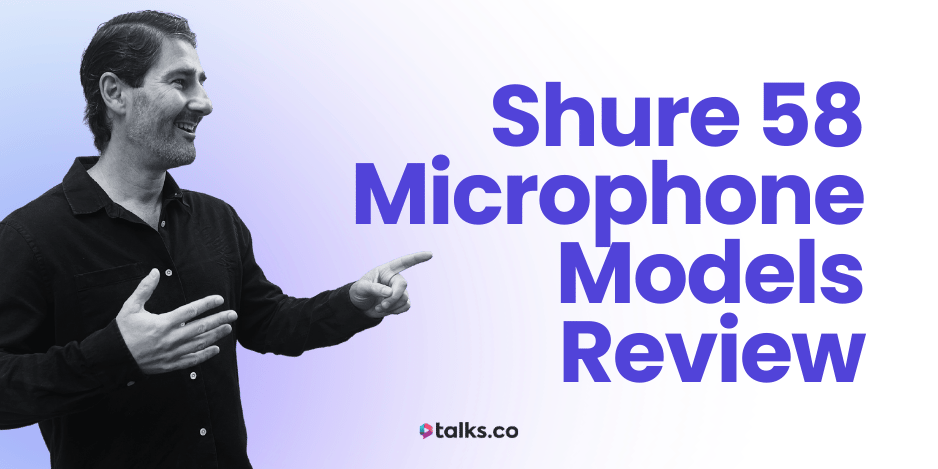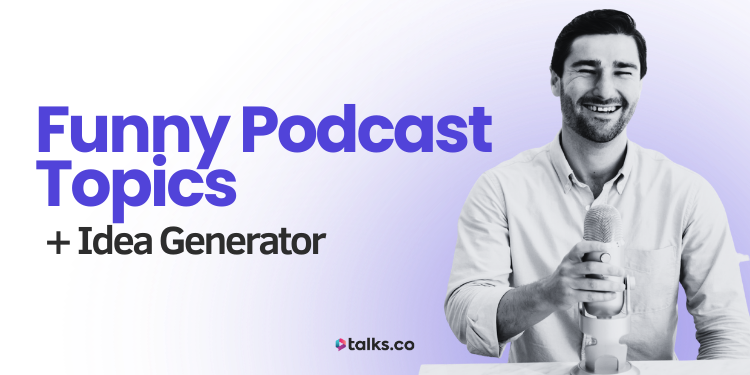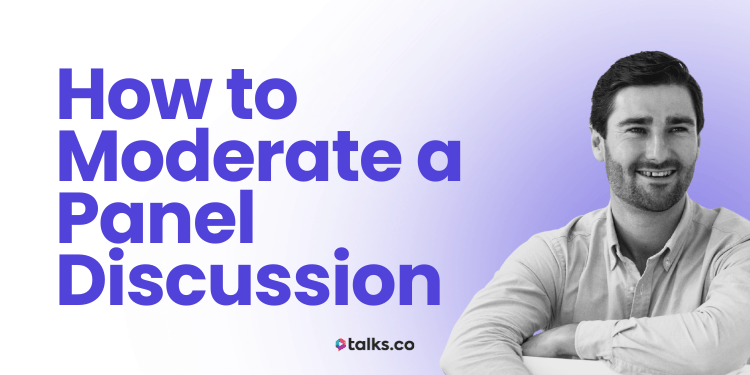Hosting a podcast can feel a bit like juggling – you’re managing questions, keeping the conversation alive, and making your guest feel at ease. It can be tricky, but when you get it right, the results are worth it.
Take my interview with Anjali Sud, the former CEO of Vimeo. She helped grow Vimeo’s community to nearly 300 million users and shared insights that had our audience hooked.
That conversation not only added value for listeners but also led to a 12-month sponsorship for our summits and opened the door to even more collaborations.
Moments like these are the gold of podcasting – and they start with knowing how to do a podcast interview well.
This guide will help you simplify the process and help your guest feel like a star, so your listeners leave inspired and eager for more.
Ready to simplify the process and design your unique interview style?
What is a Podcast Interview?
A podcast interview is more than just asking basic questions and recording answers. It’s a conversation with a purpose – one that entertains, informs, or inspires your audience while showcasing your guest’s expertise.
Done right, podcasts can feel natural, like two friends chatting over coffee, but with a clear goal: delivering value and great content to keep your listeners engaged.
Podcast Interview Model
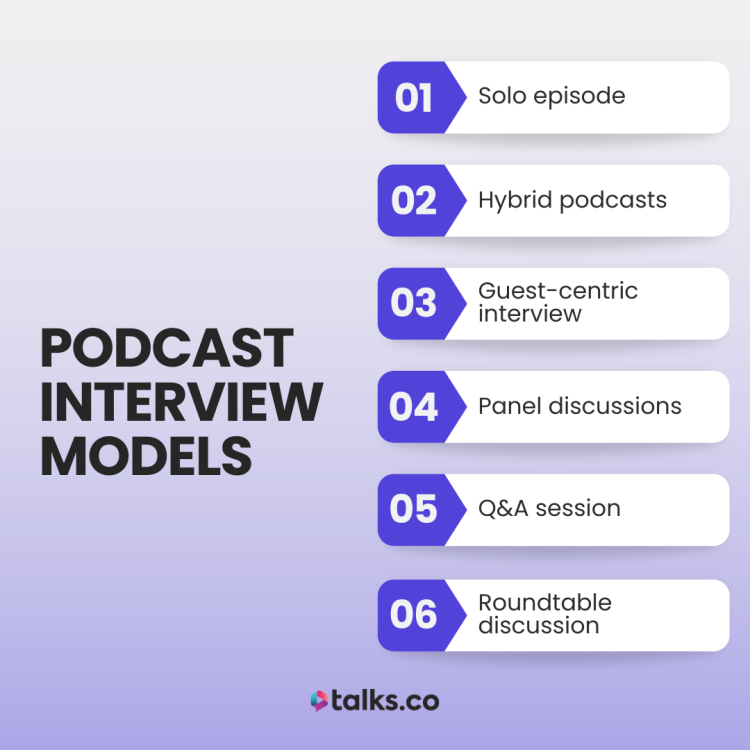
Whether you’re the podcast host or the podcast guest, understanding the different interview models, their structures, and benefits is key to making great content and a better podcast.
1. Solo episode
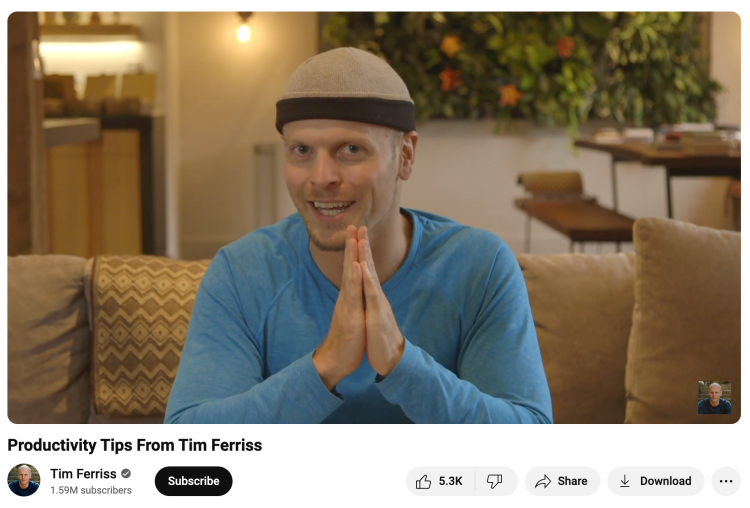
Podcasts with this format are ideal for thought leadership and showcasing your extensive knowledge on certain topics. It allows you to control the narrative and speak directly to the audience.
Example: The Tim Ferriss Show – Productivity Hacks
In this solo episode, Tim Ferriss shares his personal productivity tips and routines, providing listeners with actionable advice drawn from his experiences. His engaging storytelling and practical insights make his podcasts a compelling listen.
2. Hybrid podcasts
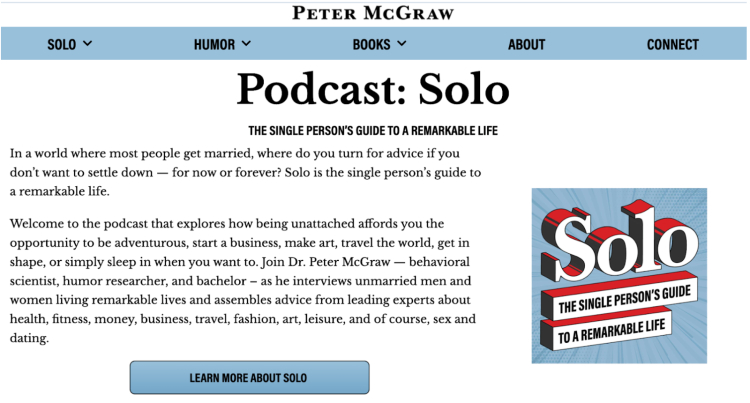
As a podcaster, you lead the show, bringing in your guests for key insights. This is ideal for when you want to keep control of the narrative while showcasing expertise.
Example: Solo: The Single Person’s Guide to a Remarkable Life podcast by Peter McGraw.
In this episode, McGraw reflects on personal narratives and self-perception, blending his own observations with lessons drawn from interviews with unmarried individuals living extraordinary lives.
3. Guest-centric interview
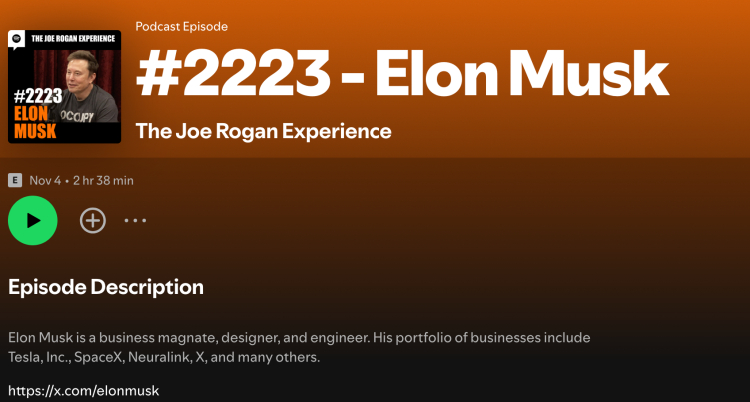
This format, in which you interview people, brings fresh perspectives, offers actionable advice, and deepens the connection between your guests’ knowledge and your audience’s needs.
Example: The Joe Rogan Experience – Elon Musk
In this episode, interviewer Joe Rogan sits down with interviewee Elon Musk to discuss everything from groundbreaking technology to the future of humanity. Rogan’s relaxed approach to conducting an interview makes the dialogue intimate and unfiltered, offering deep insights into Musk’s visionary mindset.
4. Panel discussions
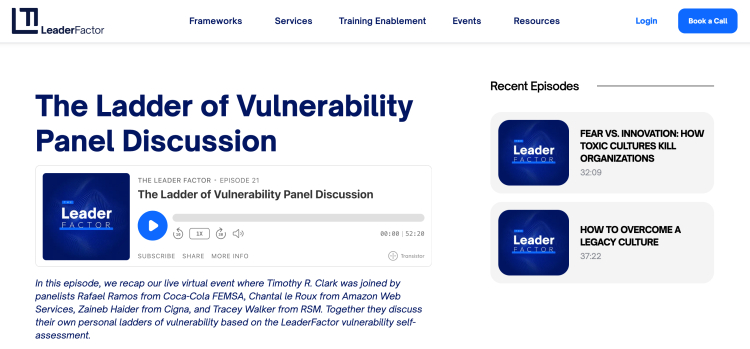
Running a podcast with this format encourages collaboration and sparks deeper conversations through diverse perspectives. It is also a great format for niche topics that benefit from multiple voices.
Example: The Ladder of Vulnerability Panel Discussion
In this episode, Timothy R. Clark is joined by panelists Rafael Ramos from Coca-Cola FEMSA, Chantal le Roux from Amazon Web Services, Zaineb Haider from Cigna, and Tracey Walker from RSM. This dynamic discussion offers a deep dive into the challenges and benefits of embracing vulnerability in leadership.
5. Q&A session
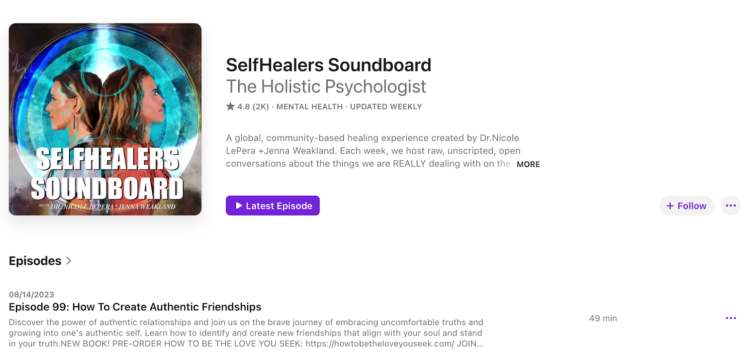
This podcast interview style engages your listeners directly and creates a more interactive experience, making your audience feel heard and valued.
Example: SelfHealers Soundboard with Dr. Nicole LePera
In their deeply personal, community-driven podcast, podcasters Dr. Nicole LePera and Jenna Weakland dive into raw, unscripted conversations about the realities of personal growth, healing, and self-discovery. This podcast creates a safe space for listeners to connect, reflect, and engage in meaningful discussions about healing and self-awareness.
6. Roundtable discussion
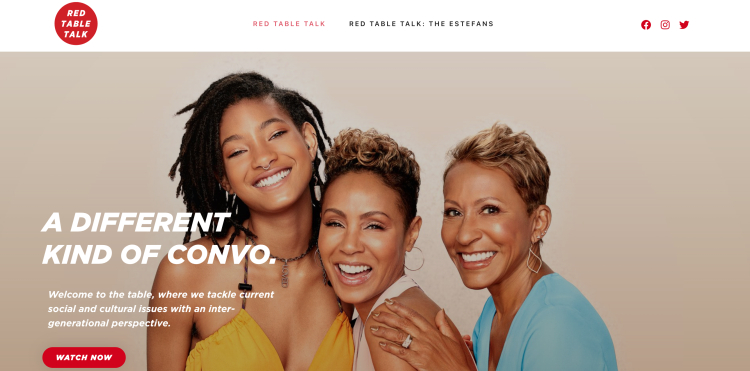
This podcast format provides a more fluid, conversational interview style while still offering expert insights. It’s perfect for building community engagement around shared interests.
Example: Red Table Talk
Podcasters Jada Pinkett Smith, Willow Smith, and Adrienne Banfield-Norris (Gammy) bring together three generations of women for candid conversations on personal, cultural, and societal issues. Each episode is a safe space for raw, open dialogue, making it a powerful format for connecting with diverse perspectives.
How to Prepare for a Podcast Interview as a Host
A successful interview isn’t just about asking podcast interview questions – it’s about creating an experience. By preparing good questions thoughtfully, you can guide your guest and audience through a meaningful conversation that resonates long after the episode ends.
The pre-match warm-up
Take time researching your guest, their social media profiles, get familiar with their work, and provide a podcast guest release form. This type of information will help set the stage for a more engaging conversation during the actual interview and build a connection from the start. Reach out, have a quick call or email exchange, and ask the right questions that make the guest on a podcast feel heard and valued.
What’s the game plan?
Every match needs a strategy, and your actual podcast is no different. Decide on what you want to achieve for every interview – are you aiming for deep insights, a light-hearted chat, or actionable takeaways? Knowing your end goal keeps the conversation focused and valuable.
Don’t let the tech trip you up
Tech issues can disrupt the flow of a podcast interview. To avoid these problems, invest in high-quality audio and recording equipment.
- Use a reliable microphone to capture clear sound.
- Opt for headphones with a comfortable fit and minimize external noise.
- Choose interview software that helps record clear audio (and even video).
How to Start a Podcast Interview
Starting strong sets the tone for the entire episode. This is your chance to ask great questions, capture attention, and set expectations.
Kick-off right
Begin with a friendly and casual opener that puts your podcast guests at ease and signals to your audience that they’re in for a good time.
- Start with a warm welcome, like: “Hey, [Guest’s Name], it’s awesome to have you here today. How’s your week been?”
- Share a quick, lighthearted anecdote or compliment, e.g., “I’ve been following your [work/project] – that [specific example] really stood out!”
- Mention something you both have in common or ask a simple, fun question, like: “You’re a big coffee fan, right? What’s your go-to order?”
The perfect podcast guest introduction
Your podcast guest should feel like a star. A strong introduction will make your guest feel comfortable, boost their confidence, and build credibility with your audience.
- Highlight their achievements briefly but meaningfully. Example: “Today’s guest is [Name], a [title/profession] who’s made waves in [industry]. They’ve helped [specific impact] and are here to share their expertise.”
- Personalize it with a specific anecdote. “I first came across [Guest’s Name] when they taught a class on [topic], and it completely shifted how I approach [specific area].”
- Keep it short but impactful. No need for a full CV rundown – just a sneak peek into your guest’s story to intrigue your audience.
Hook your audience in 60 seconds
First impressions matter. Those initial moments should convince your listeners they’ve made the right choice pressing play.
- Tease what’s coming: “Today, we’re diving into [specific topic] – get ready for insights on [specific promise].”
- Share a bold statement or surprising fact: “Did you know [statistics or insight]? You’re about to learn why that’s true and what it means for you.”
- Pose a relatable problem: “Ever feel stuck trying to [solve a challenge]? We’ve got answers.”
How to Conduct a Podcast Interview
Delivering a great podcast interview comes down to preparation, active engagement, and being ready to adapt. It’s like managing a soccer game – you can have a game plan, but staying present and flexible is what gets the win.
So, once you’ve nailed your first 60 seconds, the real magic is in keeping the energy alive and guiding the conversation like a skilled playmaker on the field.
How to avoid awkward silences
Nothing kills momentum like a long pause or when a guest responds awkwardly. Keep the conversation flowing naturally with these tactics:
- Always have a few backup questions or prompts ready, like: “Can you tell me more about [specific point they mentioned]?”
- Reflect on what your guest said to keep them talking: “That’s an interesting point about [topic]. How did you arrive at that perspective?”
- Use fillers that show interest: “That’s fascinating – what happened next?”
Ask questions that get real answers
The quality of your questions shapes the depth of your interview. Avoid yes/no questions and choose a set of questions that encourage storytelling or reflection.
- Use open-ended prompts: “Can you walk us through how you achieved [specific accomplishment]?”
- Encourage personal insights: “What’s something you wish more people understood about [topic]?”
- Get specific: “How did [specific event] shape your approach to [topic]?”
Turning curveballs into gold
Sometimes, guests say something unexpected while you’re conducting interviews, and that’s your chance to dig deeper.
- Stay flexible. If a topic comes up that wasn’t part of your prepared questions but sparks interest, follow it. Example: “I hadn’t planned to ask this, but could you expand on that point?”
- If a guest is saying something that derails the flow, acknowledge it and steer back on track. Example: “That’s such a great insight – let’s circle back to [main topic].”
- Embrace genuine moments. If something funny or unexpected happens, laugh it off and keep going.
How to Do a Podcast Intro
A podcast intro sets the stage for your episode. It’s your chance to hook listeners and create excitement about what’s coming. A weak intro can lose your audience before they even hear the good stuff – but a great one keeps them glued.
First impressions matter
The first 30 seconds of your podcast are prime time. Use this window to grab attention and set the tone. Think of it as the pre-game speech before a big match – you want to get everyone pumped.
- Start with energy: Bring your voice to life. Smile when you speak – it makes all the difference! For example: “Hey, welcome to [Podcast Name]! Today, we’ve got a brilliant episode lined up for you.”
- Share a compelling tease: Let listeners know what’s in it for them. Example: “Have you ever wondered how to land your first 5-figure coaching client? Today’s guest cracked the code and is sharing every step.”
- Make it personal: Include a quick, relatable moment. Example: “I just got back from a surf session, and it reminded me how much persistence pays off – which ties perfectly to today’s topic.”
Intros that pull listeners in immediately
Let’s break down a few winning approaches to podcast intros:
- Story hook: “Two years ago, today’s guest was sleeping on a friend’s couch, trying to figure out how to make ends meet. Now, they’re running a six-figure business. Here’s how they did it.”
- Question hook: “What’s the one mistake most coaches make when growing their audience? Stick around because we’re about to spill the tea.”
- Bold statement: “If you think virtual events are too complicated, you’re wrong – and today’s guest is here to prove it.”
Rookie mistakes to avoid
Starting off strong is key, but it’s just as important to avoid common pitfalls that can alienate your listeners before you even get going. Here are a few to watch out for:
- Being too vague: Don’t say, “Today we’re talking about coaching.” Instead, highlight a clear outcome: “You’ll learn how to grow your coaching income by 50% in three months in three easy steps.”
- Rambling: Keep your intro tight. Aim for 30-60 seconds max.
- Sounding flat: If you’re bored, your audience will tend to start feeling bored, too. Bring some personality and enthusiasm.
- Skipping a tease: Give listeners a reason to stay. A little curiosity goes a long way.
How to Interview Someone for a Podcast
Conducting a podcast interview is like coaching a soccer team – you’re there to guide the conversation, ask the types of questions that highlight your guest’s strengths, and keep the energy high.
Think like a coach
Your job as a podcast host is to make your podcast guest shine. Treat them like the star striker on your team – set them up for success.
- Background research: Study your guest’s background and work. List three to five potential questions in advance you’re excited to explore.
- Start with a warm-up: This is your time to ask a question to break the ice. Example: “I noticed you’re a runner – did you get your miles in today?”
- Celebrate their wins: Highlight their accomplishments during the conversation. For instance: “It’s amazing that you’ve coached over 500 clients – what’s been the biggest lesson from that?”
Keep it real
Nobody wants a robotic interview with weak questions. The best conversations flow naturally while staying focused.
- Prepare, but don’t over-script: Have a list of questions you want to ask, but don’t cling to it. Listen actively and let the conversation evolve naturally.
- Use follow-ups: If your guest shares something interesting, dig deeper. Example: “You mentioned struggling with imposter syndrome early on – how did you overcome that?”
- Guide, don’t dominate: Avoid turning the interview into a monologue. Balance your input with theirs.
- Watch the time: If your guest is long-winded, gently steer them back: “That’s such a great point – let’s unpack how that shaped your [specific result].”
Taming tough guests
Not every guest will be easy. Some might be nervous, talk too much, or give one-word answers. Here’s how to handle it and help them feel more comfortable:
- For nervous guests: Reassure them with kindness. Example: “Take your time – we’re just having a conversation.” Start with easy, light questions to build their confidence.
- For over-talkers: Make sure you’re politely redirecting them. Example: “That’s such a fascinating story! Can you share how that led to [specific result]?”
- For one-word responders: Prompt them with specifics. Example: Instead of asking, “What’s your advice for new coaches?”, try: “What’s one mistake you see new coaches make when pricing their services?”
How to Do Podcast Interviews Remotely
Podcasting remotely offers flexibility, but it also comes with challenges – from tech hiccups to building rapport without being in the same room. Here’s how to make your remote interviews smooth and professional.
Mastering the virtual studio
A strong setup is the backbone of any remote interview. You don’t need a Hollywood budget, but you do need reliable tools.
- Audio equipment: A good-quality USB microphone is non-negotiable. Popular options include the Blue Yeti or Audio-Technica ATR2100x. It’s worth pairing it with headphones to prevent echo.
- Recording platforms: Tools like Riverside.fm or GarageBand offer studio-quality audio and video, even over weak internet connections. They also record locally, ensuring clear sound.
- Backup plan: Always have a secondary option, like Zoom or even a phone call, in case your primary tool fails.
Building instant chemistry without meeting face-to-face
Creating a connection is key to an engaging interview – and it’s doable even remotely.
- Pre-interview chat: Spend five minutes before recording just talking. You can open up the conversation with something as simple as “I’m still laughing about my dog trying to eat my podcast notes this morning.”
- Active listening: Show you’re genuinely curious by reacting naturally. If they share a win, respond with enthusiasm: “That’s huge! How did that feel?”
- Eye contact: If you’re on video, look at the camera to simulate eye contact. It feels more personal to your guest.
How to Do a Podcast Interview Over the Phone
Phone interviews strip away visual distractions, letting you and your guest focus solely on the conversation. They’re also less intimidating for guests who might not be camera-ready.
Tricks for crisp audio when you’re miles apart
Good audio is critical – even more so when you’re relying solely on sound.
- Call recording apps: Use tools like Rev Call Recorder or Google Voice to capture the conversation. For international guests, Skype’s call recording is a reliable option.
- Landline advantage: If possible, have your guest use a landline for clearer audio.
- Microphone adapter: Invest in a TRRS adapter to connect your mic to your phone for professional-grade sound.
How to Do a Podcast Interview on Zoom
Recording your podcast on Zoom might come with a learning curve, but with the right tools and techniques, it can feel as natural as chatting in person. Here’s how you can prep your Zoom setup to host standout interviews.
Lights, camera, connection
A polished setup helps you and your guest appear professional and boosts credibility.
- Lighting: Use natural light or a ring light placed behind your camera for a flattering glow. Avoid harsh overhead lights.
- Camera angle: Position your camera at eye level. Proper camera angles allow your listeners to focus on what you’re discussing instead.
- Virtual backgrounds: If your space is cluttered, opt for a simple virtual background.
Capturing high-quality recordings
Recording on Zoom can feel risky if you’re not prepared. Here’s how to stay ready and get the most out of your Zoom interview:
- Record locally: Check your Zoom settings to enable local recordings for better quality.
- Backup audio: Use a secondary recorder like a smartphone app to capture the conversation as a fail-safe.
- Export settings: Save the recording in high-definition (1080p) and uncompressed audio formats for editing flexibility.
How to Make an Interview Podcast
Kicking off an interview podcast doesn’t have to be intimidating or scary. With the right niche, solid structure, and a bit of inspiration, you can have your audience hooked from episode one.
Picking your niche
Your podcast niche is the foundation of your success. It’s what makes your show stand out in a sea of options. Choosing your niche starts with clarity about who you are and who you want to reach.
- Focus on your expertise. Are you a fitness coach with years of experience? Build a podcast around actionable health tips or inspiring transformation stories.
- Speak to your ideal audience. Who do you want to serve? If you’re targeting mindset coaches, create content that answers their biggest questions, like handling client breakthroughs or overcoming imposter syndrome.
- Sprinkle in your personality. Your voice and vibe matter. Like my love for soccer naturally finds its way into my writing – your podcast should reflect your passions, too.
Setting the pace
A solid structure can be the difference between listeners bingeing your episodes or tuning out after one. Here’s a simple yet effective framework:
- The hook (0:00 – 0:30): Start strong. Tease what’s coming up. It could be something like, “Today’s guest scaled their coaching business to six figures in under a year – and they’re sharing every detail with you today.”
- Introduction (0:30 – 2:00): Briefly introduce yourself and your guest. Share their bio and why they’re on the show. Make it personal: “I met today’s guest at a conference, and their story blew me away!”
- Main content (2:00 – 25:00): Dive into the interview. Keep the conversation focused and engaged. Prepare ahead of time three to five questions you intend to ask to guide the discussion, use follow-up questions to dig deeper, and balance speaking time. Let your guest shine, but chime in with relatable anecdotes.
- Takeaways (25:00 – 28:00): Summarize the key points of your episode. Example: “If you’re starting out, remember – consistency, clarity, and confidence are your biggest allies.”
- Call-to-action (28:00 – 30:00): Wrap up your podcast episode with an action step. Invite listeners to connect with your guest or join your email list.
How to Find Podcast Guests to Interview
Bringing on great podcast guests isn’t as challenging as it sounds. In fact, your network is a solid starting point, but sometimes, you’ll need to think outside the box to land those dream interviews. Let’s explore a few strategies to help you build your stellar guest lineup.
Tapping into your network
Start with the people you already know. Your existing network can be a goldmine for finding insightful guests.
- Reach out to colleagues: Coaches, speakers, and authors you’ve worked with often make fantastic guests. Example: “Hey [Name], I’m launching a podcast about [topic], and I’d love to feature your expertise. Would you be open to an interview?”
- Ask for referrals: After each interview, ask your guests if they know anyone else who would be a great fit for your show. Personal recommendations build trust, and word-of-mouth is priceless.
- Look to your clients: If you’ve coached someone who achieved impressive results, invite them on. Real-life success stories are podcast gold.
Many of the people I interviewed for my summits invited me to speak on their podcasts. If you have a stage, it leads to you being invited onto more stages. So make sure you ask and also ask for referrals to other stages.
The cold outreach playbook
Want to interview a top author or thought leader? Cold outreach can work – and here’s how you can nail the approach.
- Do your homework: Know their work and highlight why they’re the perfect fit. You can reach out with something like “I loved your book, [Title], especially the chapter on [topic]. My audience of coaches would find your insights invaluable.”
- Lead with value: Share how appearing on your podcast benefits them. You could say “We’re building a listener base of 5,000 coaches eager to learn from experts like you.”
- Keep it brief and professional: Your email should let them know your podcast’s name, who your audience is, and why they’re the guest you want to be on your show.
When I reached out to Anjali Sud, the former CEO of Vimeo, I focused on how her expertise aligned with my audience’s interests. Big name guests like Anjali can magnify your show, but the key is to craft a pitch that’s thoughtful, clear, and valuable to them.
Online tools to connect with podcast guests
Sometimes, your ideal guest isn’t in your network. That’s where these tools come in handy:
- Talks: You can easily discover guests by topic, expertise, or past podcast appearances. It’s a simple way to connect with the right guests and monetize your podcast.
- LinkedIn: Use the search function to find experts in your niche. Reach out with a personalized message.
- Facebook groups: Many niches have active groups filled with potential guests. Post a callout: “I’m looking for [specific type of expert] to feature on my podcast. Send me a message if you’re interested!” Make sure to specify if your guest will be paid.
The Final Play
So, what’s the secret on how to do a podcast interview successfully? With the right preparation, curiosity, and relaxed approach, hosting a podcast interview can be as smooth as a fun-filled game of soccer.
Want an easier way to find guests to interview for your next podcast episode? Check out Talks and discover how simple it can be to find and connect with experts who make a good fit.
Sign up for free on Talks and let’s get you that dream podcast interview.
